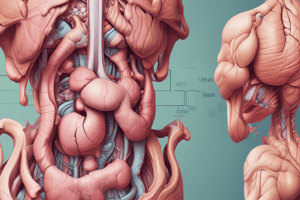Podcast
Questions and Answers
What is the most common type of hernia?
What is the most common type of hernia?
- Inguinal hernia (correct)
- Umbilical hernia
- Hiatal hernia
- Ventral hernia
What is a common cause of weakened muscles or connective tissue?
What is a common cause of weakened muscles or connective tissue?
- Obesity
- Age (correct)
- Genetics
- All of the above
What is a symptom of an inguinal hernia?
What is a symptom of an inguinal hernia?
- Bulge or lump in the upper stomach
- Feeling of heaviness in the chest
- Discomfort or pain in the testicles (correct)
- Discomfort or pain in the abdomen
What is the name of the surgical repair of a hernia that may involve the use of mesh?
What is the name of the surgical repair of a hernia that may involve the use of mesh?
Which type of hernia is more common in people over 50 years old?
Which type of hernia is more common in people over 50 years old?
What is a risk factor for developing a hernia?
What is a risk factor for developing a hernia?
What is the term for the feeling of heaviness in the abdomen?
What is the term for the feeling of heaviness in the abdomen?
What is the only effective treatment for hernias?
What is the only effective treatment for hernias?
Flashcards are hidden until you start studying
Study Notes
Definition
- A hernia is a protrusion or bulge that occurs when an organ or tissue pushes through a weakened area in the muscle or connective tissue.
Types of Hernias
- Inguinal hernia: occurs in the groin area, when a part of the intestine bulges through a weak spot in the abdominal wall.
- Most common type of hernia, accounting for 70% of all hernias.
- More common in men than women.
- Umbilical hernia: occurs near the belly button, when a weak spot in the abdominal wall allows intestine or tissue to bulge through.
- Common in newborns and infants, but can also occur in adults.
- Hiatal hernia: occurs in the upper stomach, when the stomach bulges up into the chest through an opening in the diaphragm.
- More common in people over 50 years old.
- Incisional hernia: occurs through a previous surgical incision, when a weak spot in the abdominal wall allows intestine or tissue to bulge through.
- Ventral hernia: occurs in the abdominal wall, when a weak spot allows intestine or tissue to bulge through.
Causes and Risk Factors
- Weakened muscles or connective tissue: due to age, injury, or surgery.
- Increased pressure: due to heavy lifting, coughing, or straining during bowel movements.
- Genetics: family history of hernias.
- Obesity: increases pressure on the abdominal wall.
- Coughing or straining: can weaken the muscles and increase pressure.
Symptoms
- Bulge or lump: in the affected area.
- Discomfort or pain: in the affected area, especially with coughing, straining, or heavy lifting.
- Feeling of heaviness: in the abdomen.
- Discomfort or pain: in the testicles, in the case of inguinal hernias.
Treatment
- Surgery: the only effective treatment for hernias.
- Herniorrhaphy: the surgical repair of a hernia, which may involve the use of mesh to reinforce the weakened area.
- Hernioplasty: the surgical repair of a hernia using mesh to reinforce the weakened area.
Definition
- A hernia occurs when an organ or tissue protrudes through a weakened area in the muscle or connective tissue.
Types of Hernias
- Inguinal hernia: occurs in the groin area, affecting 70% of all hernia cases, more common in men than women.
- Umbilical hernia: occurs near the belly button, common in newborns and infants, but also affects adults.
- Hiatal hernia: occurs in the upper stomach, more common in people over 50 years old.
- Incisional hernia: occurs through a previous surgical incision.
- Ventral hernia: occurs in the abdominal wall.
Causes and Risk Factors
- Weakened muscles or connective tissue: due to age, injury, or surgery.
- Increased pressure: due to heavy lifting, coughing, or straining during bowel movements.
- Genetics: family history of hernias.
- Obesity: increases pressure on the abdominal wall.
- Coughing or straining: can weaken the muscles and increase pressure.
Symptoms
- Visible bulge or lump: in the affected area.
- Discomfort or pain: in the affected area, especially with coughing, straining, or heavy lifting.
- Feeling of heaviness: in the abdomen.
- Discomfort or pain: in the testicles, in the case of inguinal hernias.
Treatment
- Surgery: the only effective treatment for hernias.
- Herniorrhaphy: surgical repair of a hernia, may involve mesh reinforcement.
- Hernioplasty: surgical repair of a hernia using mesh reinforcement.
Studying That Suits You
Use AI to generate personalized quizzes and flashcards to suit your learning preferences.




